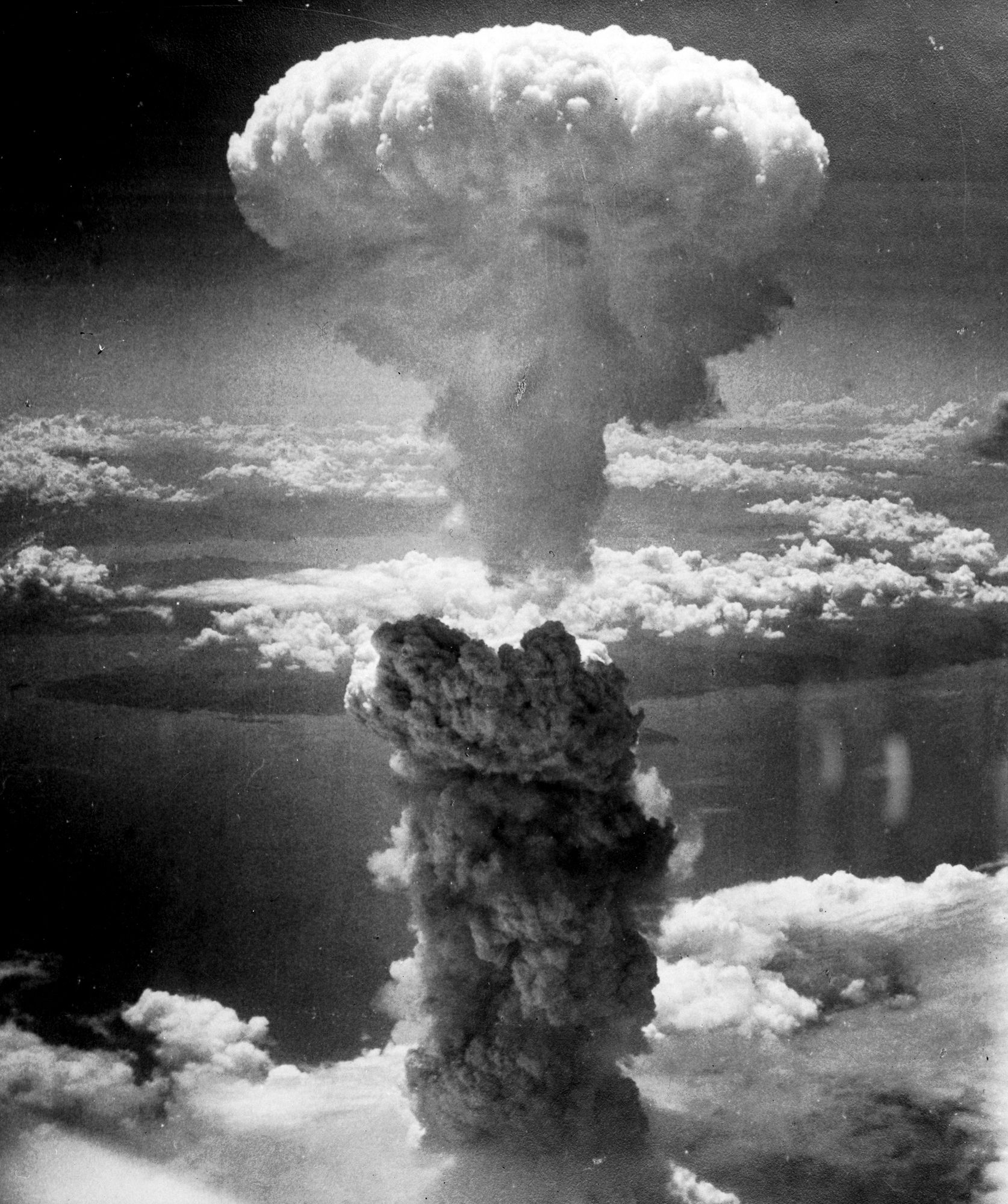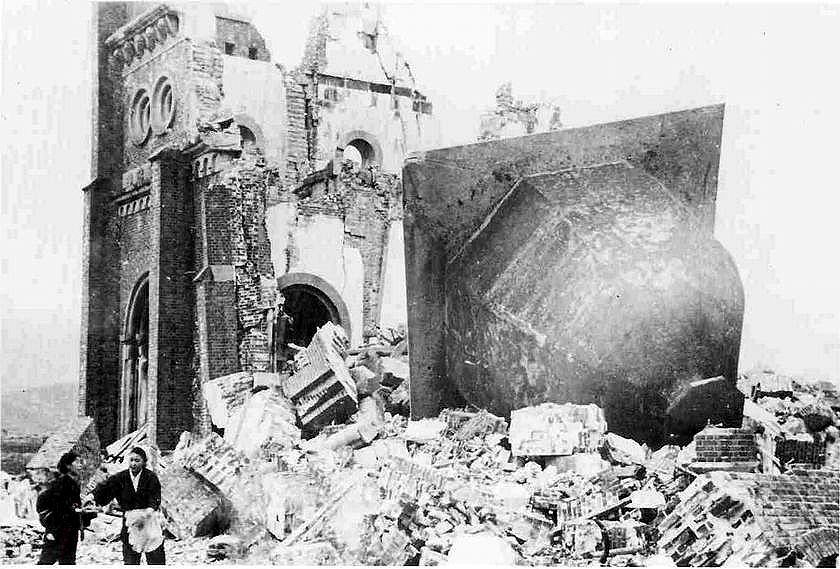 [1]
[1]HIROSHIMA, Japan (BP) — Following atomic bombings that leveled the Japanese cities of Hiroshima and Nagasaki 70 years ago this month, Southern Baptists found themselves thinking about just warfare, possible nuclear annihilation and the providence of God. But a longtime missionary to Japan says they missed an evangelistic opportunity.
 “We have all heard stories of the great open doors for the Gospel of Jesus Christ in certain lands,” wrote W.H. (Dub) Jackson, a longtime pastor, evangelist and missionary in Japan, “but whatever we have heard, there could never have been a country more open to the Gospel than was Japan following World War II.” Had Southern Baptists sent more missionaries, “we could be talking about a Christian nation today.”
“We have all heard stories of the great open doors for the Gospel of Jesus Christ in certain lands,” wrote W.H. (Dub) Jackson, a longtime pastor, evangelist and missionary in Japan, “but whatever we have heard, there could never have been a country more open to the Gospel than was Japan following World War II.” Had Southern Baptists sent more missionaries, “we could be talking about a Christian nation today.”
The United States dropped atomic bombs on Hiroshima and Nagasaki Aug. 6 and 9, 1945, respectively, prompting the Japanese to surrender Sept. 2, ending World War II. The only use of nuclear weapons in warfare before or since, the atomic blasts killed some 140,000 people.
Jackson, an American fighter pilot during the war, was among the occupying force in Japan immediately following the surrender. In his memoir “Whatever It Takes,” Jackson wrote of sharing the Gospel with Japanese people during his free time and discovering overwhelming receptivity to Christ. Current International Mission Board missionary to Japan Tak Oue told Baptist Press the spiritual openness stemmed from Japan’s military defeat.
“There were so many people eager to hear [the Gospel] that they were standing outside of the church buildings listening to the message,” Oue said. “I think it was … related to the spiritual vacuum among the Japanese people since the emperor declared himself to be man instead of a god and Christianity was the religion of the conquering nation.”
 Yet Southern Baptists did not send a sufficient number of missionaries to Japan, according to Jackson’s estimate, and the nation is less than 1 percent Christian today.
Yet Southern Baptists did not send a sufficient number of missionaries to Japan, according to Jackson’s estimate, and the nation is less than 1 percent Christian today.
Modern Japanese citizens continue to remember the atomic bombings, said Oue, whose father was a Japanese soldier killed in World War II. Most Japanese are pacifists in part because of the pain associated with being the first and only nation to experience a nuclear attack.
“Japanese people realize that the Japanese military did terrible things to Asian countries,” Oue said. “… I think most people regret what the military did.” Still, “Japanese people have suffered much, and that’s one reason they don’t want to have anything to do with war.”
‘Man has lifted the curtain’
When news of the bombings broke in the U.S., Southern Baptists realized they were living in a historic period. The Baptist New Mexican newsjournal editorialized, “Man has lifted the curtain and has peeped into the very creative mind of God. Unless, however, he has in the same action plumbed the living heart of God, he shall bring the universe into ruins at his stumbling feet.”
The Alabama Baptist noted, “Speculation and theory extending into the realms of fantasy have been reached in the evaluation of the American developed atomic bomb, which is by all conservative estimates, the greatest force of destruction yet perfected and made practical by men of science.”
At least one Southern Baptist denounced the use of nuclear weapons almost immediately. Edwin McNeill Poteat, a former North Carolina pastor who was serving as president of Colgate-Rochester Divinity School in upstate New York, was one of 59 religious and educational leaders to sign a 1945 statement calling the bombings “an atrocity of a new magnitude.”
The “reckless and irresponsible employment” of atomic bombs “against an already virtually beaten foe,” Poteat and his colleagues said, “will have to receive judgment before God and the conscience of humankind. It has our unmitigated condemnation.”
But denouncing the bombings was not the reaction of most Southern Baptists. State Baptist papers defended America’s use of atomic weapons as consistent with the ethics of just warfare.
The Baptist Standard of Texas editorialized, “The American people will never cease to regret that we were forced to use such measures to stop an enemy who deliberately defied every code of common decency in a wild rampage of murderous pillage and plunder of peace loving nations. America did not want to be forced to use the atomic bombs any more than we wanted to be forced into war. Our fighting forces were generous and fair in giving our foe a chance to avoid destruction and by giving warning to the people of Japan in advance of destructive raids upon their cities.”
The mention of advance warning may have been a reference to a July 26 warning by Allied leaders that failure to surrender would result in “the inevitable and complete destruction of the Japanese armed forces and just as inevitably the utter devastation of the Japanese homeland.” The U.S. military also dropped leaflets over some cities slated for bombing.
The Baptist New Mexican denounced as a “pseudo-Christian” a commentator who said America “had sunk to new depths of immorality.” It was no worse “to use one mighty bomb and destroy a hundred thousand people in one hellish blast” than it would have been “to drag out the agony by dropping a whole series of smaller bombs of a more conventional nature.”
The New Mexican added, “Americans might ask if it is ethically worse for our men to undergo the March of Death on Bataan at the hand of maniacal captors than it is for Japanese to die instantly without torture” — a reference to a forced march during which thousands of American and Filipino prisoners of war were killed by Japanese soldiers.
Speaking from a 21st-century perspective, Douglas Carver, former Army chief of chaplains, told BP “most Southern Baptists” today “would agree that the decision to drop atomic bombs on Hiroshima and Nagasaki was … within the parameters of just warfare.”
“The United States dropped the bombs as a last resort to end World War II,” said Carver, executive director of chaplaincy for the North American Mission Board. “The Allied Powers, led by the United States, were a legitimate authority confronting the Japanese Empire whose leadership refused the terms of unconditional surrender. Regarding proportionality, General of the Army George C. Marshall said that the 140,000 civilians killed from the bombs prevented a catastrophic ground war in Japan that could have exceeded one million military and civilian casualties. Unfortunately, and for future consideration, the destructive power of nuclear bombs make it impossible to discriminate between combatants and non-combatants.”
‘Tremendous possibilities’
In 1945, Southern Baptist Theological Seminary President Ellis Fuller said the possession of such an atomic weapon necessitated the improvement of moral virtue among Americans.
“The time has come when men must give more time and thought and energy to moral progress,” Fuller wrote in South Carolina’s Baptist Courier. “Unless we develop character which will make us worthy trustees of such power to assure its right and profitable use, the destruction of Hiroshima will be but the beginning of incalculable tragedies which harnessed atomic power will bring to the human family.”
Pennsylvania evangelist Eddie Martin argued in a 1946 sermon that the technology behind atomic bombs could yield enormous good if utilized by righteous individuals.
“Little has been written about the tremendous possibilities of using atomic energy for the good of mankind because men know that we have obtained God-like power but that we are not God-like,” Martin said. “However, if man is able to turn this new power into constructive use, we will see advancements made that are wonderful in their nature.”
Martin, an inductee into the Conference of Southern Baptist Evangelists’ Hall of Faith, speculated that atomic energy could be used to fuel more efficient cars and airplanes, “save labor in the home” and perhaps even cure cancer.
Fellow Hall of Faith evangelist Jesse Hendley saw God’s providence in America’s development of atomic bombs. He speculated God may have used the atomic bomb to discipline the Japanese for emperor worship, and he warned Christians not to fear nuclear annihilation.
“Don’t let any passing thing, even an atomic bomb, upset a child of God,” Hendley said in a sermon preached Aug. 26, 1946. “God is on the throne. You don’t have to worry about Him. He’s right on time. Only when He gets ready will He set in motion the great machinery of the last days.”
‘We must confess’
Hendley and Martin both used the widespread fear of nuclear war as an occasion to call sinners to trust Christ for salvation. As Martin put it, “there is only one way to escape” the eternal “effects of the possible destruction caused by the release of an atomic bomb by an enemy on our country.”
“As in Noah’s day there was only one escape — it was the ark — so today there is one ark. He is Jesus. Get yourself in Him tonight,” Martin said. “Let Him do a work of regeneration, of making new, in your heart tonight.”
While Jackson applauded such evangelistic zeal, he wished Southern Baptists had focused it more intently on Japan.
“We must confess,” Jackson wrote, “that we failed to accept the challenge God gave us for Japan. We did not give Japan what we could have given, what they requested and what God expected us to give.”
As American Christians remember the bombings, Carver asked them to pray for remaining survivors, the families of survivors, members of the U.S. armed forces and U.S. leaders who develop national security policy.
“Churches and church leaders must not be ignorant or silent regarding the national debate on the development and/or use of weapons of mass destruction,” Carver said. “Our churches have an influence in shaping national consciousness and individual conscience regarding our national security strategy, the use of WMD, armed conflict and international diplomacy.”
Among other Southern Baptist connections to Hiroshima and Nagasaki:
— Kentucky Baptist Gil Niceley was aboard the Straight Flush, an aircraft that flew ahead of the famed Enola Gay, which dropped the Hiroshima bomb, to survey weather conditions and recommend whether to proceed with the mission.
Niceley, who died in 2005, told Baptist Press in 1995, “I can see Hiroshima below me now. After seeing that weather conditions were suitable for a visual drop, Buck [Major Claude ‘Buck’ Eatherly] gave clearance to the Enola Gay to proceed with bombing. Around 8:16 a.m., we saw a tremendous flash and felt vibrations in the air. The vibrations were not only earth-rattling, they came with extreme heat.”
— Nagasaki was a secondary target Aug. 9 and was bombed because the primary target, Kokura, was obscured by clouds and smoke. In Kokura, the prominent tower of a Southern Baptist-sponsored school for girls had reportedly been identified as the bomb’s target, according to a history of Southern Baptist missions in Japan by Calvin Parker.
